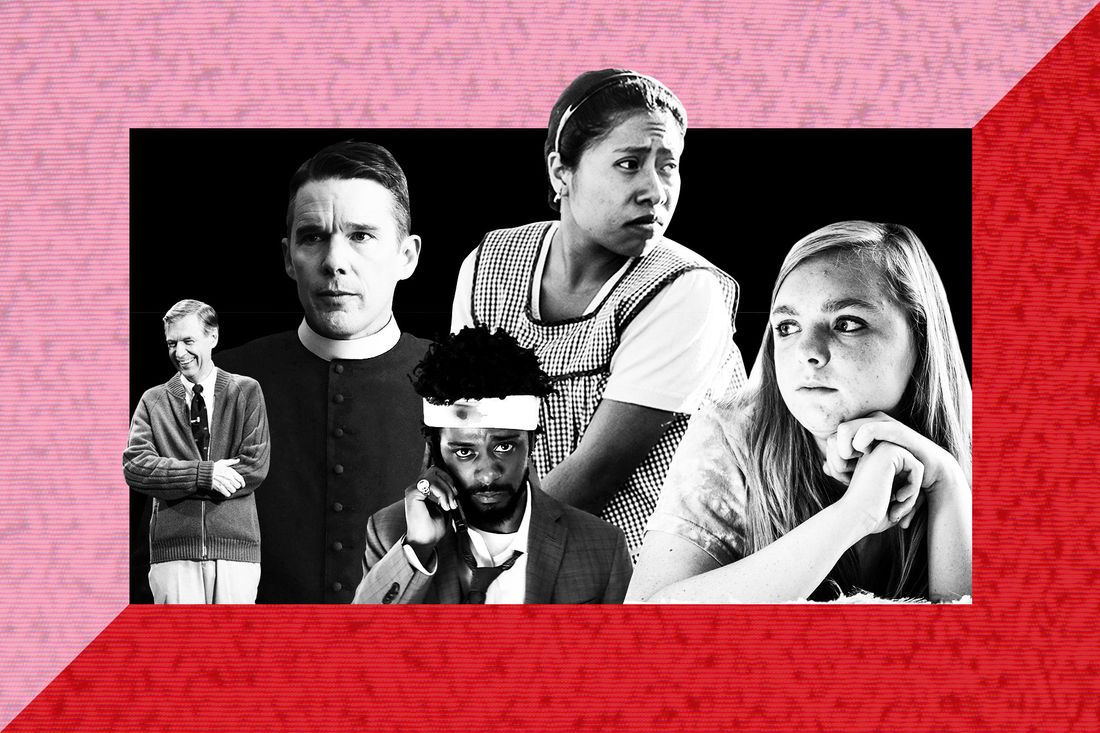
Below, you’ll find Vulture critic David Edelstein’s favorite movies of 2018, including an urgent documentary, a dark surrealist comedy, a few directorial debuts, and staggering new entries from some of our favorite directors.
10. Leave No Trace
Debra Granik’s moving saga of a 13-year-old girl (Thomasin Harcourt McKenzie) who slowly realizes that she and her profoundly traumatized war-vet father (Ben Foster) are on different life journeys. Granik’s heroines never move on happily, but — as they’re responsible for themselves, kids, and, implicitly, the life of the species — move on they do.
Michael Moore’s most urgent and far-reaching documentary, Fahrenheit 11/9, was resolutely ignored at the box office — your loss, folks. See it now for its acid evocation of Trump’s rise, its peroration against Establishment Democrats, and its exhortation to grass-roots activism as the U.S. Constitution hovers on the brink.
8. Private Life
Tamara Jenkins’s woebegone comedy of modern confusion focuses on a middle-aged couple (Kathryn Hahn and Paul Giamatti, both sublime) who are relentlessly unsuccessful at conceiving a child, and the young, eager-to-please step-niece (the vivacious Kayli Carter) who could offer an (extremely problematic) answer.
7. The Ballad of Buster Scruggs
From Joel and Ethan Coen comes one of their richest and most allusive films: six Old West yarns of various lengths and tones, ranging from larky to tragic to transcendental — a history of America in which the frontier provides the starkest imaginable stage for cosmic puppet plays revealing God as a homicidal prankster.
Morgan Neville gently (how else?) eases us into the neighborhood-as-world of the late Mr. Fred Rogers in which all talk is soft; all fantasy is plainly handmade, as if by a child in a playroom; and the most important thing we’re meant to take away is that no matter how we look or feel (big, small, sad, mad), we’re special, each of us, loved unconditionally by this nice, nice man.
Boots Riley’s debut feature is an increasingly — and riotously — fantastical tale of an ambitious telemarketer (Lakeith Stanfield) who’s suddenly privy to a corporate takeover of humankind. Hint: The future Mr. Rogers might well ask, “Won’t you be my neeeighbor?”
4. The Rider
Chloé Zhao’s stunning portrait of a young South Dakota cowboy (real-life rider Brady Jandreau) who struggles to come back from a near-deadly head injury is keyed to the rhythms of the horses that give his life its center: You’re drawn to the animals as he is — to both their profound stillness and the wildness that takes so many vehement riders to the brink.
Paul Schrader’s austere but searching loss of faith drama nudges Bergman and Bresson into the 21st century and its looming environmental calamities. His hero’s an alcoholic pastor (Ethan Hawke) who finally scourges his flesh in an attempt to get God (who probably doesn’t even exist) to answer the question, Can You forgive humans for what we’ve done to the world?
2. Eighth Grade
Comedian Bo Burnham’s debut feature charts the last week of middle school for a lonely 13-year-old girl, Kayla (Elsie Fisher), reminding you what great teenage coming-of-age stories share: a nearly unbearable level of anxiety. As Kayla reaches out via YouTube videos for affirmation, she articulates the existential challenge of her age: “It’s about ‘putting yourself out there’ — but where is ‘there’?”
1. Roma
Alfonso Cuarón’s haunting portrait of a socially, racially, and sexually stratified Mexico City in 1970 and ’71 comes dressed as an autobiographical memory play: Cuarón’s stylized recollection of his newly broken middle-class family and of the housekeeper, Cleo (Yalitza Aparicio), who struggled to find her equilibrium in a world in which she had so little power. An indigenous Mexican (her primary language is Mixtec) in a country ruled by the descendants of Spanish colonialists, Cleo holds herself in reserve, and at first even the camera can’t quite penetrate her mask of stoicism. But slowly … slowly … the audience is drawn in, and Cuarón’s formal, black-and-white cinematography (nearly every shot is a gliding horizontal line) begins to pay off emotionally. Cleo is buffeted, trapped, nearly broken, until her suffering and endurance takes on the quality of myth. Does Cuarón overidealize Cleo? Certainly. But the hard, material fact of her and of Aparicio’s performance gives Roma its human core. If you weep through the final credits, you won’t be alone.


